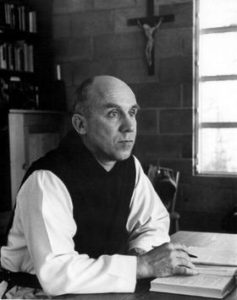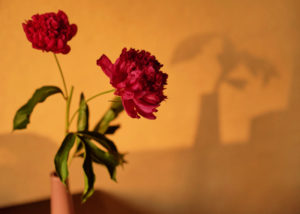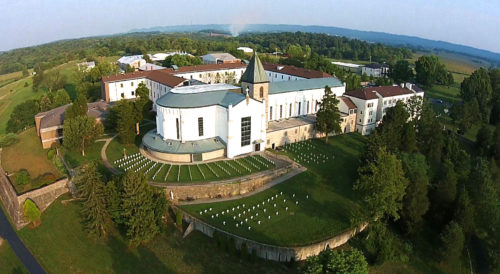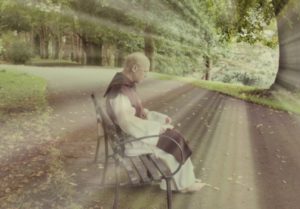Thomas Merton by
Jane St. Clair
Thomas Merton once started an entry in his diary with the wonderful statement: “Today was a perfect day.”

We might look back and say the perfect day is when I landed that contract, got that award, or when my sweetheart said I love you. But to Thomas Merton, perfection lay in little things that pleased him, which is why just walking in the Kentucky woods was his idea of perfection.

Merton was so spiritual that he once had a transcendental experience looking at a vase of carnations. The flowers with their colors and crinkled edges struck him right in his soul, and he went rapturous:

…..Beauty of the sunlight falling on a tall vase of red and white carnations and green leaves on the altar of the novitiate chapel. The light and dark, the darkness of the fresh crinkled flower, light, warm and red all around the darkness. The flower is the same color as blood, but it is in no sense whatever as ‘red as blood,’ not at all. It is as red as a carnation, only that. This flower, this light, this moment, this silence = Dominus est. God is eternity. He passes. He remains.”
Looking at the flowers on the altar triggers a deep mystical experience in Merton, an experience of God and eternity. He doesn’t want to compare the color of the flowers to blood or anything else.
He just experiences the flower itself.

He writes this next:
…..We pass in and out. He passes. We remain. We are nothing. We are everything. He is in us. He has gone from us. We are here in him. He is gone from us. He is gone from us. He is not here. We are here in Him. All these things can be said, but why say them? All these things can be said, but why say them?…..The flower is itself. The light is itself. The silence is itself. I am myself. All perhaps illusion, but no matter. For illusion is the shadow of reality, and reality is the grace and gift that underlies these lights, these colors, this silence underlies: is that true? They are simply real. They themselves are his gift…

By being present to ordinary things most of us overlook, Merton was practicing what we’d call “mindfulness.” It is a shutting down of your own ego to open up to what’s around you. To experience what is.

He looked at everything with an artist’s eyes, and saw beauty and God in a vase of carnations, in a drop of water on a leaf, in the way the clouds slowly part to reveal sky, in a wren resting on a book. He experienced them as gifts from God, and his writing is his gift to us.

